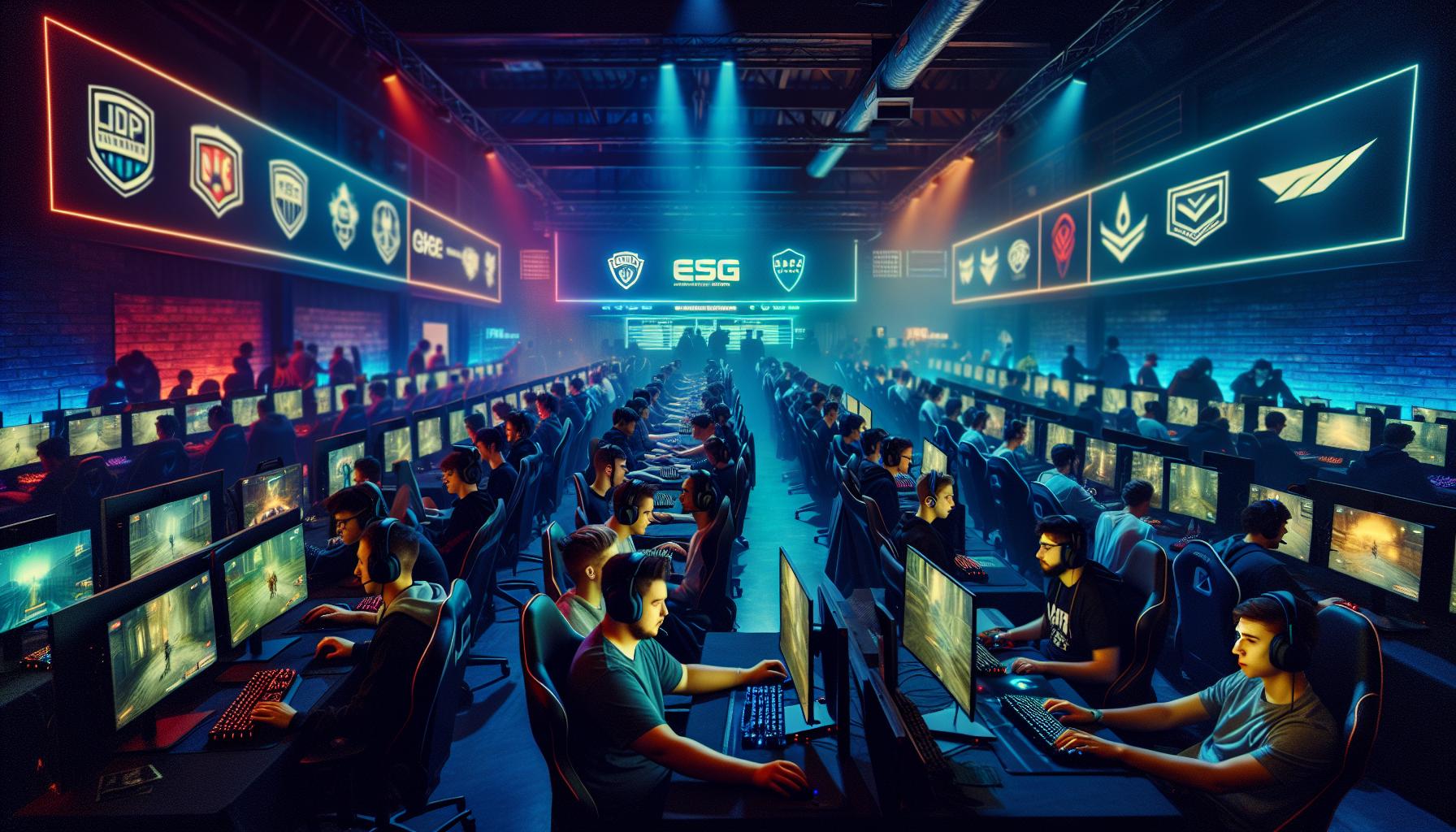Key Takeaways
- Historical Significance: Call of Duty esports began with grassroots LAN tournaments in the early 2000s and has grown into a globally recognized competitive scene since its first championship in 2013.
- Key Titles: Major installments like Modern Warfare and Black Ops II have transformed the competitive landscape, introducing innovative gameplay and community engagement.
- Professional Teams: Teams such as OpTic Gaming and FaZe Clan have set high standards in competitive play and have become icons within the esports community, attracting fans and sponsorships.
- Impactful Players: Legendary players like Scump and Crimsix have significantly influenced the scene, inspiring new generations and elevating the level of competition.
- Streaming Influence: Platforms like Twitch and YouTube have revolutionized viewer engagement, allowing for real-time interaction and significantly increasing the audience for Call of Duty esports events.
- Community Engagement: Strong connections between players, teams, and fans, fueled by social media and live events, have fostered a dedicated and vibrant community around Call of Duty esports.
From its inception in 2003, Call of Duty has evolved into a powerhouse in the esports arena. What started as a single-player World War II shooter quickly transformed into a competitive battleground where teams clash for glory and substantial prize pools. The franchise has captivated millions, drawing in both casual gamers and dedicated fans, creating a vibrant community around its competitive scene.
As the years rolled on, tournaments like the Call of Duty Championship and the introduction of the Call of Duty League marked significant milestones in its history. These events not only showcased top-tier talent but also solidified Call of Duty’s place in the esports landscape. Understanding this journey reveals how the game has shaped competitive gaming and continues to influence the future of esports.
Call of Duty Esports
Call of Duty esports emerged in the early 2000s, gathering momentum alongside the franchise’s rapid growth. Initial competitions featured local LAN tournaments, fostering grassroots involvement. As the community expanded, more significant events showcased rising talent, leading to the establishment of formal leagues.
Major milestones in Call of Duty esports include the first Call of Duty Championship in 2013, which attracted worldwide attention. This event set a precedent for competitive play, as teams from various regions competed for substantial prizes. Over the years, prize pools multiplied, reflecting the franchise’s increasing popularity.
The creation of the Call of Duty League in 2020 marked a pivotal moment. This franchise-based league introduced a consistent competitive structure, enabling teams to compete across multiple seasons. The league attracted prominent organizations, enhancing visibility and investment in professional Call of Duty.
Innovative gameplay formats, like 4v4 and the introduction of new game modes, contributed to the dynamic nature of matches. These formats accommodate various player styles and strategies, keeping competitions fresh and engaging for audiences.
As of 2023, the Call of Duty esports scene remains vibrant, with numerous tournaments and events scheduled throughout the year. The community continues to rally around its favorite teams and players, solidifying Call of Duty’s status as a staple in the esports landscape.
Early Years of Call of Duty Esports

The early years of Call of Duty esports laid the foundation for its current stature in the competitive gaming world. Grassroots tournaments emerged, fostering a community passionate about competitive play.
The Birth of Competitive Play
Competitive play in Call of Duty began with local LAN tournaments shortly after the game’s release in 2003. Players formed teams, competing in informal settings, which generated enthusiasm and established a competitive spirit. Notable titles, such as Call of Duty 4: Modern Warfare, elevated this phenomenon, leading to organized competitions and dedicated player communities. The enthusiasm from these early competitions paved the way for larger events, setting a stage for future esports success.
Major Tournaments and Events
Major tournaments significantly shaped the Call of Duty esports scene. The first notable event, the Call of Duty Championship, took place in 2013, attracting thousands of spectators and offering substantial prize pools. Teams from around the globe competed, showcasing elite gameplay and strategic depth. Events like MLG (Major League Gaming) and ESL (Electronic Sports League) also played crucial roles, serving as platforms for competitive players to gain recognition. These tournaments laid the groundwork for the structured leagues that followed, transforming casual play into a professional sport by attracting sponsorships and media attention.
The Evolution of Call of Duty Titles in Esports

The Call of Duty franchise has evolved significantly in esports, shaping how competitive gaming is perceived and played. Key titles transformed the competitive landscape and introduced new gameplay elements.
Key Titles Impacting the Scene
- Call of Duty 4: Modern Warfare (2007): This title marked a pivotal shift to modern settings, attracting a diverse competitive community and hosting early esports events.
- Call of Duty: Black Ops II (2012): With a robust multiplayer experience and the introduction of League Play, this installment further solidified competitive play, featuring significant events and tournament support.
- Call of Duty: Ghosts (2013): Despite mixed reviews, it hosted the first Call of Duty Championship, showcasing professional talent and boosting the franchise’s esports visibility.
- Call of Duty: Advanced Warfare (2014): It introduced exosuit mechanics, requiring players to adapt strategies, and successfully engaged viewers with new gameplay dynamics.
- Call of Duty: WWII (2017): This return to historical settings revitalized interest and celebrated the franchise’s roots while maintaining a competitive focus.
- Call of Duty: Modern Warfare (2019): The reboot offered high-impact gameplay, rigorous competitive options, and a renewed focus on community-driven events, enhancing player engagement.
- Call of Duty: Vanguard (2021): This title emphasized integrated league play, fostering professional development and maintaining the franchise’s competitive tradition.
- Team Formats: The transition from 6v6 to 4v4 competitive formats enhanced strategy and coordination among teams, emphasizing teamwork and skill.
- Game Modes: Introduction of various game modes, such as Search and Destroy and Hardpoint, diversified competitive play and demanded adaptability from players.
- Map Design: Evolving map layouts have prioritized dynamics and sightlines, influencing player strategies and enhancing spectator engagement during matches.
- Gun Mechanics: Ongoing adjustments to weapon handling and balance have maintained a competitive edge, requiring players to master varied playstyles.
- Spectator Features: Enhanced viewing experiences, including live commentary and in-game statistics, have improved audience engagement and attracted new fans to the esports scene.
- Skill-Based Matchmaking: The introduction of skill-based matchmaking has ensured balanced competitive matches, thereby improving player satisfaction and maintaining high gameplay standards.
Rise of Professional Teams and Players

The competitive landscape of Call of Duty esports saw a significant transformation with the rise of professional teams and players. This evolution marked a pivotal shift from casual gaming to well-structured, high-stakes competition.
Notable Teams in Call of Duty Esports
Several teams have defined the Call of Duty esports scene through their consistent performance and impressive accolades.
- OpTic Gaming: Known for its domination in the competitive scene, OpTic boasts multiple championship titles across various Call of Duty editions.
- FaZe Clan: FaZe Clan’s strategic gameplay and roster changes have kept it at the forefront of competitions, consistently challenging for titles.
- Team Envy: With strong performances in both team and individual play, Team Envy has secured its place among the elite in Call of Duty esports.
- Atlanta FaZe: Formed as part of the Call of Duty League, Atlanta FaZe quickly emerged as a top-tier team, known for its skillful play and impressive record.
These teams elevate the competitive atmosphere, drawing fans and sponsors, which catalyzes further investment in the esports ecosystem.
Influential Players and Their Impact
Several players significantly shaped the trajectory of Call of Duty esports through extraordinary skill and leadership.
- Seth “Scump” Abner: Often regarded as one of the greatest Call of Duty players, Scump’s aggressive playstyle and tactical acumen inspired many in the community.
- Kenny “Kenny” Williams: His versatile gameplay and consistent performance have made him a standout player, contributing to his team’s successes.
- Ian “Crimsix” Porter: Known for his tactical genius, Crimsix holds the record for the most championship titles in Call of Duty history, influencing future players extensively.
- Chris “Simp” Lehr: As a young prodigy, Simp’s rapid ascent to stardom showcased the potential within the esports realm and attracted a new generation of players.
These players helped elevate the Call of Duty esports narrative, demonstrating the competitive skill and dedication required for success. Their legacies continue to inspire aspiring gamers and enrich the esports community.
The Role of Streaming and Media
Streaming platforms and media coverage have played pivotal roles in elevating Call of Duty esports, directly impacting its audience reach and community engagement.
Growing Awareness through Platforms
Streaming platforms like Twitch and YouTube have revolutionized how audiences engage with Call of Duty esports. Events streamed live attract millions of viewers, offering real-time interaction through chats and social media. Major tournaments, such as the Call of Duty Championship, have leveraged these platforms for broad visibility, enabling fans to follow their favorite teams and players closely. The integration of live commentary enhances viewing experiences, promoting a deeper understanding of competitive strategies. Annual viewership for Call of Duty events often exceeds several million, reflecting the franchise’s growing popularity in the esports world.
Community Engagement and Fanbase Development
Community engagement has flourished through social media and streaming interactions. Teams and players actively cultivate connections with fans via platforms like Twitter, Instagram, and TikTok. Regular updates, behind-the-scenes content, and interactive live streams foster a sense of belonging among fans. Esports organizations host fan meet-and-greet events, allowing supporters to engage directly with their favorite teams. Additionally, community-driven initiatives, such as online tournaments, encourage player participation and expand the fanbase. This engagement has solidified loyalty among followers, contributing to a vibrant and dedicated Call of Duty esports community.
The journey of Call of Duty esports is a testament to the franchise’s ability to adapt and thrive in a competitive landscape. From its humble beginnings in local tournaments to the establishment of a structured league, it’s clear that Call of Duty has become a cornerstone of esports culture.
With innovative gameplay and a dedicated community, the franchise continues to attract talent and engage fans worldwide. As new titles and formats emerge, the future of Call of Duty esports looks promising, ensuring its place in the ever-evolving world of competitive gaming. The legacy of its players and teams will undoubtedly inspire the next generation of gamers, securing Call of Duty’s status as a leader in the esports arena.